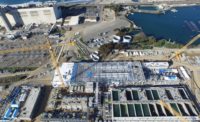The XPRIZE Foundation, a California nonprofit that designs and hosts public competitions intended to encourage technology development, has announced launch of a five-year global effort that will provide a total of $119 million in funding for new approaches to address water scarcity through sustainable seawater desalination.
While desalination technology has existed for more than 100 years, the market has stalled in terms of innovations that reduce its cost, says Lauren Greenlee, executive vice president of the Food + Water + Waste domain at XPRIZE. Only 1% of the world’s clean water is produced by desalination, and “of the thousands of plants in existence, 70% are in wealthy countries,” she says.
About 50 selected teams will be narrowed to two finalists that can most efficiently produce 1 million liters of potable water per day over the course of a year. One finalist will be awarded about $40 million to scale up its desalination technology, and other will receive $8 million to develop novel membrane materials. Runners up also will receive funding.
“With global water demand projected to outstrip supply by 40% by 2030, the timeliness of this competition could not be more crucial,” Greenlee says—although also acknowledging negative environmental impacts associated with desalination plants, including powerful intakes that harm marine life, highly saline brine directly released into the environment and need for major power use.
Greenlee says XPRIZE wants to motivate and support teams—ranging from groups of students to well-established firms—to design and scale up new technologies that are not just cost-effective, but also meet specific environmental needs in the U.S. and other global areas.
In addition to meeting freshwater production criteria, judges will favor submissions that reduce impact on marine environments, eliminate harmful chemicals, promote material longevity and optimize energy intensity and sourcing, XPRIZE officials say,
Greenlee says that it would likely take five years or more for a full-scale desalination project, based on a winning competition technology, to be in operation. “To see a team, or even multiple teams, head in that direction would be tremendous,” she adds.
XPRIZE has successfully incubated innovative designs for a range of challenges related to climate, biodiversity, health and more. In 2020, co-finalist Carbon Upcycling created a technology to sequester carbon dioxide in concrete. A decade earlier, a winning firm called Elastic patented an oil spill cleanup technology that recovered oil at a rate three times higher than the industry’s previous best.
Such successes leave Greenlee hopeful about the impact of the XPRIZE water scarcity competition. “I think about [how] … we're only getting 1% globally of our clean water from desalination and I would hope that 10-plus years after the prize, that number is more toward the double digits.”



Post a comment to this article
Report Abusive Comment